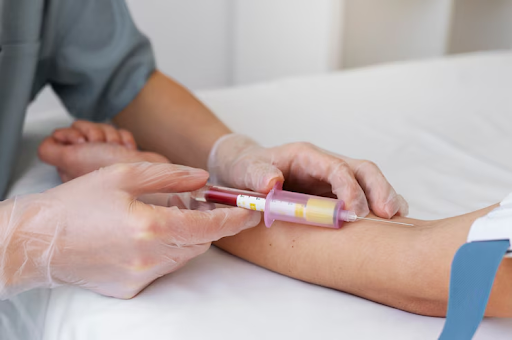Notifications
ALL BUSINESS
COMIDA
DIRECTORIES
ENTERTAINMENT
FINER THINGS
HEALTH
MARKETPLACE
MEMBER's ONLY
MONEY MATTER$
MOTIVATIONAL
NEWS & WEATHER
TECHNOLOGIA
TV NETWORKS
VIDEOS
VOTE USA 2026/2028
INVESTOR RELATIONS
COMING 2026 / 2027
ALL BUSINESS
COMIDA
DIRECTORIES
ENTERTAINMENT
FINER THINGS
HEALTH
MARKETPLACE
MEMBER's ONLY
MONEY MATTER$
MOTIVATIONAL
NEWS & WEATHER
TECHNOLOGIA
TV NETWORKS
VIDEOS
VOTE USA 2026/2028
INVESTOR RELATIONS
COMING 2026 / 2027
 Boyes Giros -
May 8 -
Other -
Phlebotomy Training Tips
-
182 views -
0 Comments -
0 Likes -
0 Reviews
Boyes Giros -
May 8 -
Other -
Phlebotomy Training Tips
-
182 views -
0 Comments -
0 Likes -
0 Reviews

Phlebotomy is more than just drawing blood. It's a skill that combines technical precision and patient care, ensuring both accurate blood collection and a comfortable experience for the patient. If you're based in Birmingham and looking to master this essential medical skill, you've come to the right place. This blog offers top training tips for aspiring phlebotomists and highlights key competencies you'll need to excel in this vital role.
Whether you're stepping into the healthcare field for the first time or looking to refresh your skills, Birmingham offers excellent resources like the Birmingham Phlebotomy Training Course, designed to equip you with everything you need to succeed.
Phlebotomy demands more than just technical knowledge. Accuracy, professionalism, and the ability to put patients at ease are all traits of successful phlebotomists. Failing to undergo proper training can lead to issues like inconsistent results, patient discomfort, or even complications such as vein damage.
Additionally, the healthcare industry highly values phlebotomists who demonstrate proficiency, safety, and compassion. Employers are more likely to hire candidates with professional training from trusted institutions. This puts you ahead of the competition and opens the door to a rewarding career in healthcare.
Drawing Blood for diagnostic tests, donations, or transfusions
Patient Interaction to ensure clear communication and comfort
Understanding Equipment such as needles, syringes, and vacutainers
Following Protocols to ensure proper labelling, storage, and transportation of samples
Maintaining Cleanliness and Safety with strict adherence to hygiene standards
The combination of these responsibilities makes it clear why high-quality training matters.
A phlebotomist must be familiar with veins, arteries, and the human circulatory system. Begin by understanding the locations of commonly used veins, such as the median cubital vein, cephalic vein, and basilic vein.
Knowing how blood flows and the role veins play in the process will help reduce failed attempts at drawing blood and improve patient comfort. Practicing with realistic training arms or attending workshops on anatomy will provide invaluable hands-on experience.
Effective phlebotomy is rooted in proper technique. This includes using the correct angle to insert the needle, gently anchoring the vein, and effectively removing the tourniquet before withdrawing the needle.
Pay close attention during your training sessions to how professionals demonstrate these steps. Take every opportunity to practice under supervision to develop confidence.
Phlebotomy is a patient-facing role, and building trust is essential. Always explain the procedure clearly to the patient before beginning, even for routine blood draws. Use a calm and friendly tone to help ease any anxiety they may feel.
For nervous or first-time patients, acknowledge their concerns and offer reassurance. Something as simple as "You're doing great, we're almost done" can make a world of difference in patient experience.
Healthcare safety is non-negotiable in phlebotomy. During your training, focus on proper glove use, needle disposal methods, and sterilization procedures. Missteps in hygiene can result in contamination or even legal consequences.
Ensure you understand and follow all protocols for handling sharps and biological waste. Keeping your workspace clean and organized is also key to maintaining efficiency during your shifts.
Even with training, certain challenges may arise during blood draws. These include collapsing veins, rolling veins, or difficult-to-locate veins. Ask your instructor for tips on handling these situations.
For example, using a warm compress can make veins easier to locate, and asking the patient to clench their fist can help bring veins closer to the surface. Training sessions often include simulations that prepare you for these real-life scenarios.
Birmingham offers fantastic opportunities for hands-on phlebotomy training. From workshops to accredited training programs, you'll find plenty of resources to fine-tune your skills.
Look for programs like the Birmingham Phlebotomy Training Course, which combines theoretical knowledge with hands-on practice. Practicing in a supervised environment is invaluable for building confidence and precision.
Healthcare is constantly evolving, and so are the guidelines surrounding phlebotomy. Stay informed about industry changes by attending refresher courses or webinars offered by professional organizations.
For example, new technology, such as vein finders or updated safety protocols for handling biohazards, may be introduced. Adapting to these advancements ensures you remain competitive in your field.
A trained phlebotomist enjoys excellent job prospects, as their skills are in constant demand across hospitals, diagnostic labs, and donation centres. Whether you aim to specialize further within the medical field or prefer to sharpen your skills for the long term, professional training paves the way for success.
Additionally, Birmingham's healthcare ecosystem provides ample opportunities for employment, thanks to its thriving medical research hubs and healthcare institutions.
When choosing a training program, keep an eye out for these critical features to ensure you're getting the best experience possible:
Accreditation: Ensure the program meets healthcare standards in the UK.
Hands-On Learning: Choose courses that offer plenty of time for practice.
Experienced Trainers: Learn from healthcare professionals with proven expertise.
Flexibility: If you're balancing work or family commitments, find a program that offers evening or weekend classes.
Career Support: Some programs provide job placement assistance after completion.
By enrolling in a top-tier program like the Birmingham Phlebotomy Training Course, you'll gain access to these features and lay a strong foundation for your healthcare career.
Phlebotomy training is about more than mastering technical skills. It's about joining a community of professionals dedicated to patient care and precision. Once you've completed your training, connect with peers and mentors who can offer ongoing support and advice.
Online forums, local healthcare networks, and professional organizations can help you stay informed and grow within your field.
Mastering phlebotomy requires dedication, practice, and professional guidance. Whether you're a beginner or looking to improve your technique, Birmingham offers countless resources to help you succeed.
If you're ready to start your training, consider enrolling in the Birmingham Phlebotomy Training Course. With expert trainers, hands-on practice, and a focus on industry standards, you'll be well-equipped to thrive as a skilled phlebotomist.
Don't wait to begin your career in healthcare. Your path to expertise starts today!
